Serving 998 students in grades 6-8, Raymond A. Villa Fundamental Intermediate ranks in the bottom 50% of all schools in California for overall test scores (math proficiency is bottom 50%, and reading proficiency is bottom 50%).
The percentage of students achieving proficiency in math is 10% (which is lower than the California state average of 33%). The percentage of students achieving proficiency in reading/language arts is 28% (which is lower than the California state average of 47%).
The student:teacher ratio of 20:1 is lower than the California state level of 21:1.
Quick Stats (2025)
- Grades: 6-8
- Enrollment: 998 students
- Student:Teacher Ratio: 20:1
- Overall Testing Rank: Bottom 50% in CA
- Math Proficiency: 10% (Btm 50%)
- Reading Proficiency: 28% (Btm 50%)
- Science Proficiency: 12% (Btm 50%)
- Source: National Center for Education Statistics (NCES), CA Dept. of Education
School Overview
Raymond A. Villa Fundamental Intermediate's student population of 998 students has declined by 28% over five school years.
The teacher population of 50 teachers has stayed relatively flat over five school years.
Grades Offered
Grades 6-8
Total Students
998 students
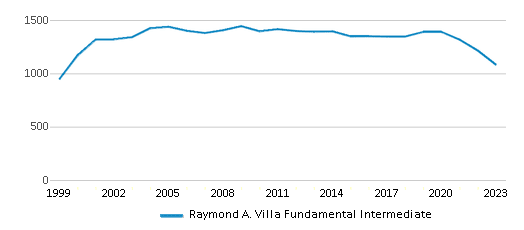
Gender %
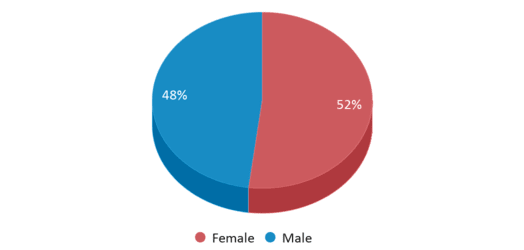
Total Classroom Teachers
50 teachers
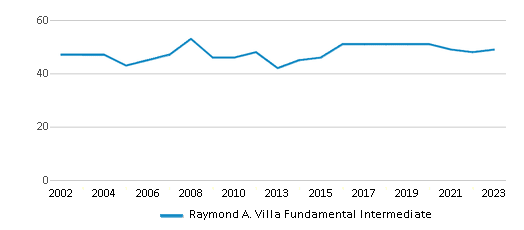
Students by Grade
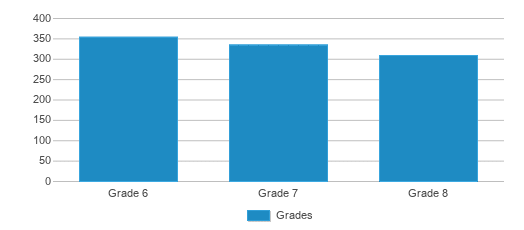
School Rankings
Raymond A. Villa Fundamental Intermediate ranks within the bottom 50% of all 9,602 schools in California (based off of combined math and reading proficiency testing data).
The diversity score of Raymond A. Villa Fundamental Intermediate is 0.06, which is less than the diversity score at state average of 0.63. The school's diversity has stayed relatively flat over five school years.
Overall Testing Rank
#8259 out of 9602 schools
(Bottom 50%)
(Bottom 50%)
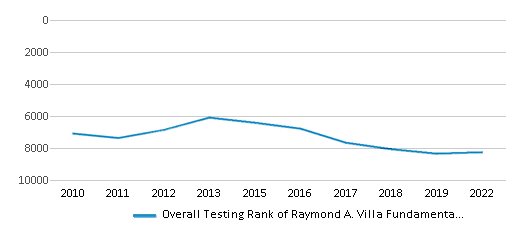
Math Test Scores (% Proficient)
10%
33%
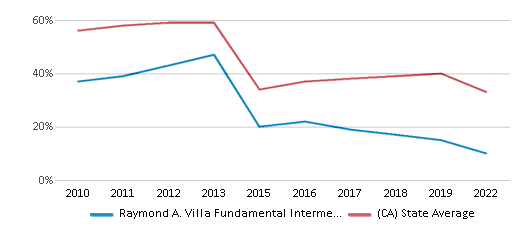
Reading/Language Arts Test Scores (% Proficient)
28%
47%
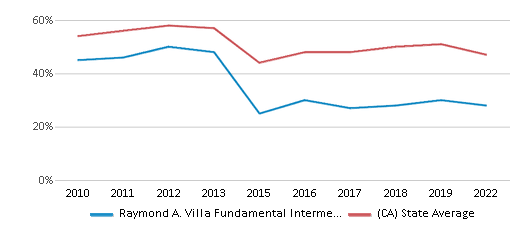
Science Test Scores (% Proficient)
12%
29%
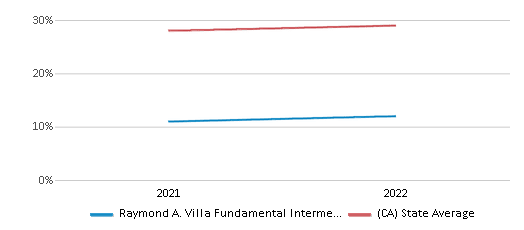
Student : Teacher Ratio
20:1
21:1
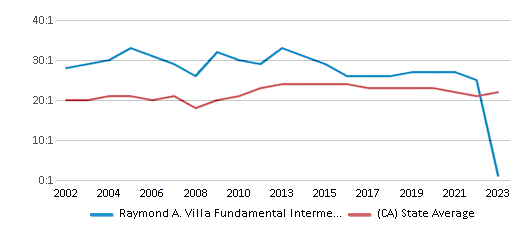
American Indian
n/a
1%
Asian
2%
12%
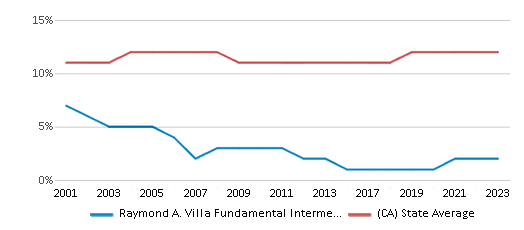
Hispanic
97%
56%
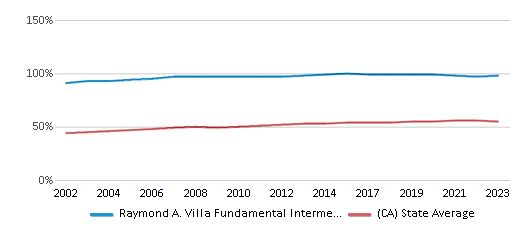
Black
n/a
5%
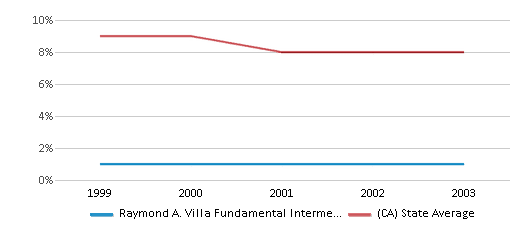
White
n/a
20%
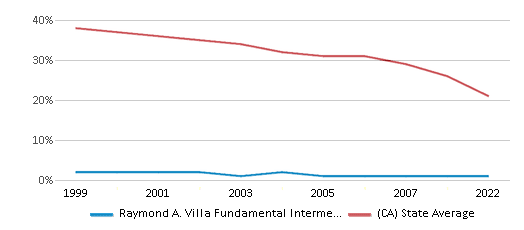
Hawaiian
n/a
n/a
Two or more races
1%
6%
All Ethnic Groups
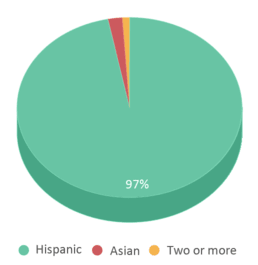
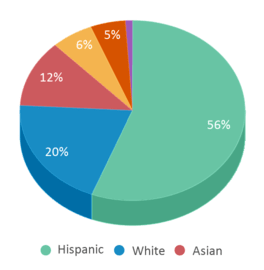
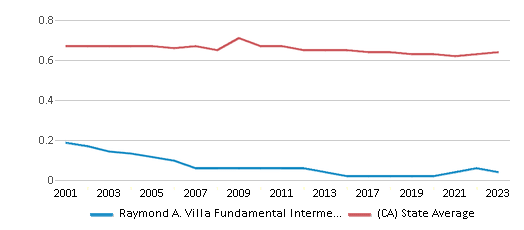
Eligible for Free Lunch
75%
54%
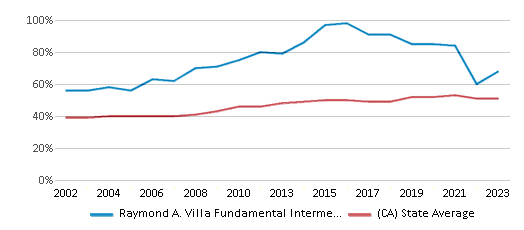
Eligible for Reduced Lunch
6%
8%
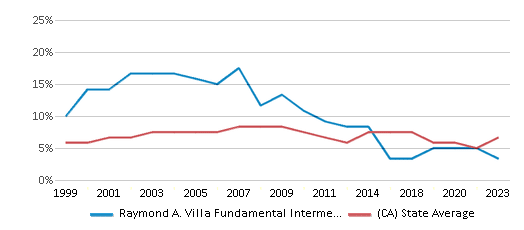
School Statewide Testing
School District Name
Source: National Center for Education Statistics (NCES), CA Dept. of Education
Profile last updated: 02/09/2025
Frequently Asked Questions
What is Raymond A. Villa Fundamental Intermediate's ranking?
Raymond A. Villa Fundamental Intermediate is ranked #8259 out of 9,602 schools, which ranks it among the bottom 50% of public schools in California.
What percent of students have achieved state testing proficiency in math and reading?
10% of students have achieved math proficiency (compared to the 33% CA state average), while 28% of students have achieved reading proficiency (compared to the 47% CA state average).
How many students attend Raymond A. Villa Fundamental Intermediate?
998 students attend Raymond A. Villa Fundamental Intermediate.
What is the racial composition of the student body?
97% of Raymond A. Villa Fundamental Intermediate students are Hispanic, 2% of students are Asian, and 1% of students are Two or more races.
What is the student:teacher ratio of Raymond A. Villa Fundamental Intermediate?
Raymond A. Villa Fundamental Intermediate has a student ration of 20:1, which is lower than the California state average of 21:1.
What grades does Raymond A. Villa Fundamental Intermediate offer ?
Raymond A. Villa Fundamental Intermediate offers enrollment in grades 6-8
What school district is Raymond A. Villa Fundamental Intermediate part of?
Raymond A. Villa Fundamental Intermediate is part of Santa Ana Unified School District.
In what neighborhood is Raymond A. Villa Fundamental Intermediate located?
Raymond A. Villa Fundamental Intermediate is located in the Lyon Street neighborhood of Santa Ana, CA.
School Calendar
View the Raymond A. Villa Fundamental Intermediate yearly calendar below. Note key dates such as:
Event
Date
Spring Break-No School
April 07, 2025 (Monday)
Last Day of School-Modified Day
May 29, 2025 (Thursday)
School Reviews
5 3/24/2020
I love this school I don't ever wanna leave villa because it is a very good school yes it sometimes has fights but its is one of the best schools ever I am the second generation to go to villa and I love it I begged my mom to let me go there because she was gonna put me in heninger but I refused to go and I was so happy when I got accepted in the school and was picked in the raffle I am a 7th grader now and i still love going to villa even tho i don't really like school i like going because I get to see some very amazing friends just like my best friend ever he is the best and I love him a lot so that's it by people of the world.
2 7/4/2011
Large class sizes, frequent administrative turnover, and low teacher morale plague this fundamental school, making it difficult for parents to be involved and students to be successful. Due to budget cuts, extracurricular clubs and activities and support of ABC program have all but disappeared. Quality of teaching and academic programs has been greatly reduced over the last three years.
Review Raymond A. Villa Fundamental Intermediate. Reviews should be a few sentences in length. Please include any comments on:
- Quality of academic programs, teachers, and facilities
- Availability of music, art, sports and other extracurricular activities
Recent Articles

What Is A Charter School?
Explore the world of charter schools in this comprehensive guide. Learn about their history, how they operate, and the pros and cons of this educational innovation. Discover key facts about charter schools, including admission policies, demographics, and funding, as well as what to look for when considering a charter school for your child.

10 Reasons Why High School Sports Benefit Students
Discover the 10 compelling reasons why high school sports are beneficial for students. This comprehensive article explores how athletics enhance academic performance, foster personal growth, and develop crucial life skills. From improved fitness and time management to leadership development and community representation, learn why participating in high school sports can be a game-changer for students' overall success and well-being.

February 05, 2025
Understanding the U.S. Department of Education: Structure, Impact, and EvolutionWe explore how the Department of Education shapes American education, from its cabinet-level leadership to its impact on millions of students, written for general audiences seeking clarity on this vital institution.





